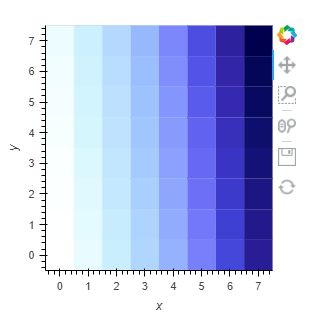Based on my post from last year I’m still struggling with supplying alpha values to a HeatMap like object in a correct way. I found that I can pass dimension names, which worked very well at first.
However, I noticed that my data is often irregularly spaced, which is why I can’t use the HeatMap object for each case. For these cases I wanted to switch to QuadMesh which got me what I wanted for the general visualization (no white blocks between unevenly space values), however it doesn’t seem to support alpha dimension mapping yet. Below a short example.
import numpy as np
import holoviews as hv
from holoviews import opts
hv.extension('bokeh')
n = 8
xs = np.logspace(1, 3, n)
ys = np.linspace(1, 10, n)
zs = np.arange((n-1)**2).reshape(n-1, n-1)
alpha = zs / 48 # just an example
hv.QuadMesh((xs, ys, zs, alpha), kdims=["x", "y"], vdims=["z", "alpha"]).opts(alpha="alpha")
This gives me the following error:
ValueError [Call holoviews.ipython.show_traceback() for details]
Mapping a dimension to the "alpha" style option is not supported by the QuadMesh element using the bokeh backend. To map the "alpha" dimension to the alpha use a groupby operation to overlay your data along the dimension.
I didn’t get the groupby operation that is mentioned in the error to work for me here. How can I apply the correct alpha values for each point with QuadMesh?
